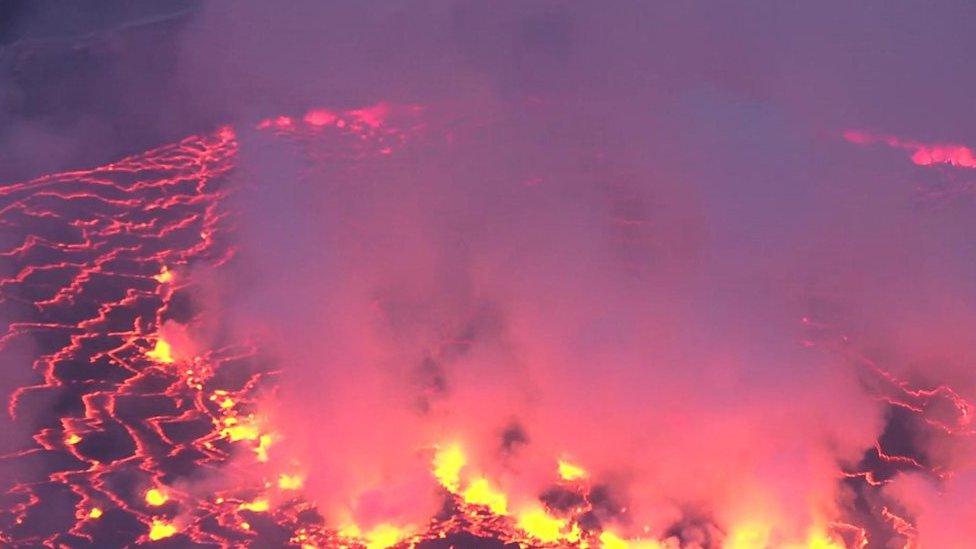Volcano tourism in the spotlight after New Zealand eruption
- Published
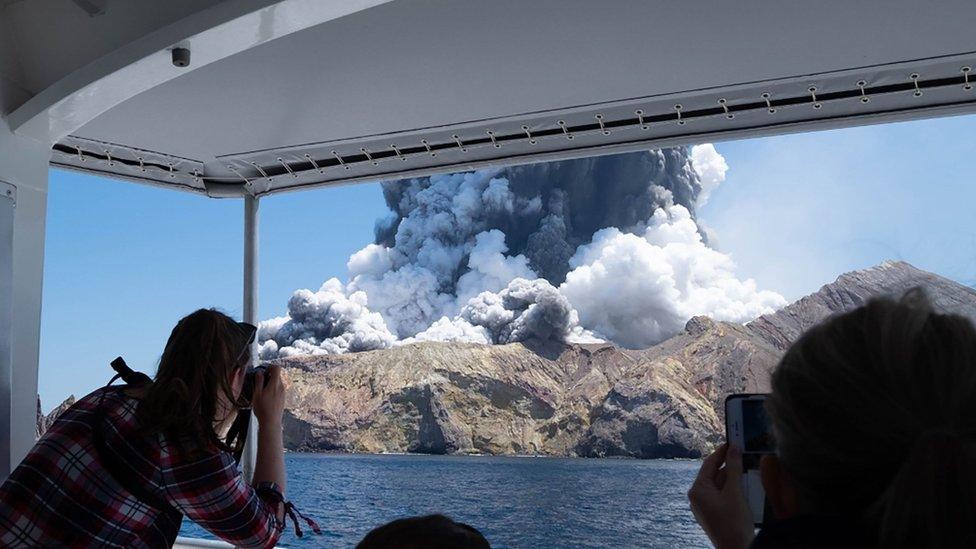
New Zealand's White Island volcano spews steam and ash moments after erupting
The deadly eruption of a New Zealand volcano has drawn a spotlight on how active volcanoes draw crowds of tourism each year.
With so many active volcanoes on the planet, tourists are seeking out thrills on mountains from Japan to DR Congo.
Some of those have had eruptions in the recent past but still - or possibly because of that - are high up on the list of visitors.
"Getting close to volcanoes offers a rare opportunity to experience the power of the restless earth: the smouldering, seething release of pressure from the brittle crust of earth caused by the crush of tectonic plates," says travel journalist Simon Calder.
"But with the reward comes a range of risks. They can include sulphur dioxide and other toxic volcanic gases, material from the volcano being thrown out, lava flows and possible resulting wildfires, landslides and, for coastal locations, tsunamis."
So here's an overview of several of the world's most popular and recently active volcanoes.
Indonesia
The recent eruption of Mount Agung in Bali made headlines around the world. Starting in 2017, it is still ongoing but in its first year led to airspace closures and widespread evacuations.
Until then, though, the mountain had been a popular hiking destination for visitors to the island.
Another active Bali volcano is Mount Batur, which to this day remains a favourite sunrise hike.
It last erupted in 2000 spewing ash from several smaller explosions. The last lava flow at the mountain was in 1963.
Near Bali on the island of Lombok is Mount Rinjani, one of the country's most active volcanoes.
Timelapse footage from 2017 shows ash at Mount Agung
With frequent eruptions, access to the crater is sometimes restricted but tourist numbers are increasing nonetheless.
Another volcano that is a major tourist attraction is Mount Bromo on Java, where visitors can get up close to the sulphurous smoke coming from the crater.
Not far from Bromo is Mount Ijen which often can be seen with a plume of smoke above the mountain but can also be visited by tourists.
Italy
Towering over the city of Catania, Mount Etna on Sicily is constantly active, but tourists still scale the highest permitted point of 2,920m (9,580ft) in large numbers.
A BBC team and a number of tourists suffered minor injuries in 2017 after being caught up in an incident during an eruption.
The moment a BBC crew was caught in an Etna explosion
Mount Vesuvius in Naples is one of the world's best known volcanoes, mainly due to its eruption in AD 79 that wiped out the Roman cities of Pompeii, Herculaneum, Oplontis and Stabiae.
More than two million people visit the area around the mountain, though the majority of them come to see the ancient ruin sites. It hasn't erupted since 1944.
Japan
Being one of the world's most seismically active nations, Japan accounts for around 20% of earthquakes worldwide of magnitude 6.0 or more.
It's also home to many active volcanoes, the most iconic being Mount Fuji near Tokyo. As an active volcano, Fuji last erupted in the 18th Century. It's now visited as a mountain rather than an active smouldering volcano.
But Japan does have those as well. Mount Asama last erupted in 2015 and is one of the country's most active volcanoes. The crater is closed to tourists but there are a number of hiking trails popular with visitors.
Eyewitnesses and helicopters caught dramatic images of the eruption
Mount Shirane is another example of a crater that can be easily reached but the mountain remains dangerous. In 2018, one person was killed and several injured by an avalanche triggered by an eruption.
In the south of the country, Mount Aso last erupted in 2016. But as the crater can be easily visited by car or ropeway, it is a very popular destination for tourists. The frequent volcanic activity means, though, that every now and then the crater is off limits to visitors.
The biggest recent eruption in the country was that of Mount Ontake which erupted without warning in 2014, killing 63 people.
The sudden eruption that year was described as "like thunder" by one woman who runs a lodge near the summit.
The mountain had been a popular hiking spot and there had been no seismic activity to warn authorities ahead of the tragedy about to happen.
Philippines
Mount Mayon is known for its "perfect cone" symmetrical shape.
It has erupted nearly 50 times since its first recorded explosion in 1616 and its last activity was in 2018. Around 1,200 people lost their lives during an eruption in 1814.
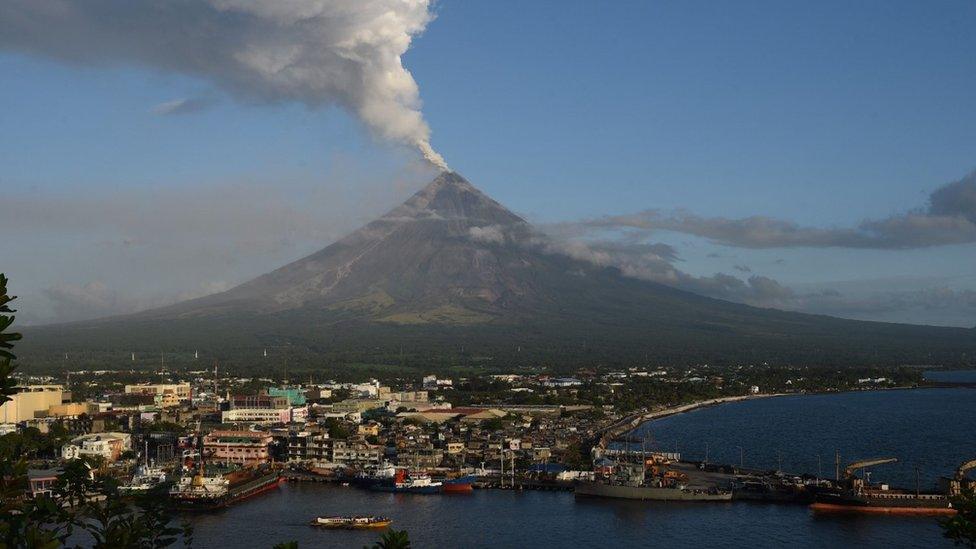
Mount Mayon is known for its "perfect cone" shape
It is one of the most popular tourist destinations in the country and one tour company describes it as a "breath-taking experience filled with an exciting adventure and the thrill that it can erupt anytime", external.
On 15 June 1991, the second largest volcanic eruption of the 20th Century took place when Mount Pinatubo killed around 800 people.
But today large numbers sign up for "once in a lifetime", external tours of the mountain.
Iceland
Eyjafjallajökull and Katla volcanoes are popular with tourists. Eyjafjallajökull made international headlines in 2010 when it erupted, throwing volcanic ash skywards, leading to the closure of much of European airspace.
UK authorities say they are better prepared than last year, when a similar ash cloud caused widespread chaos
Benedikt Bragason, a tour guide of the volcanoes, told the BBC that tourists are usually enthused when told stories about eruptions.
"We do tell them everything, we tell them the scary stories. They still want to go, it's even more exciting and people trust us to go up there and not put their life in danger," he said.
Montserrat
The Soufriere Hills Volcano on the Caribbean island of Montserrat reawakened in the 1990s, forcing two-thirds of the island's population to evacuate.
However, David Lea from Montserrat Island Tours said the dramatic eruption has since been a pull for many visitors.
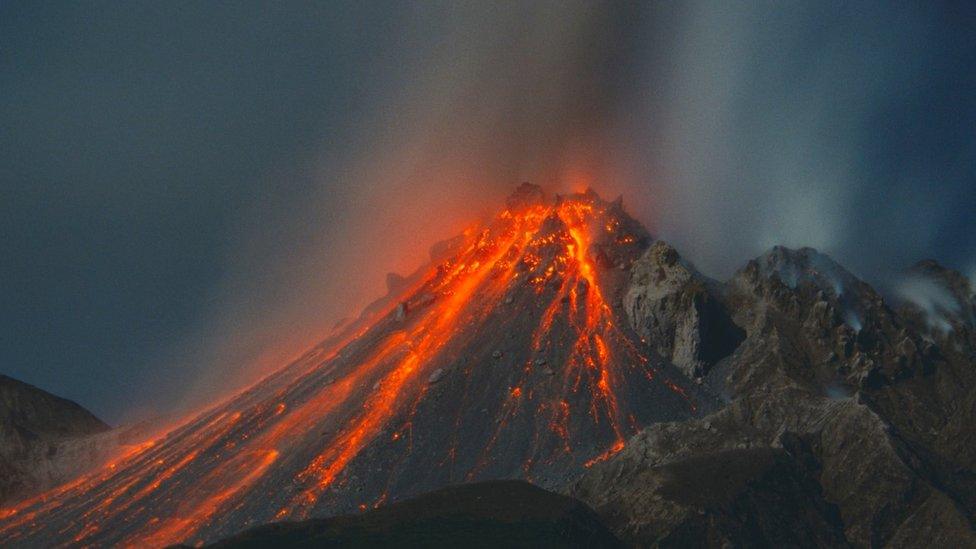
The Soufriere Hills volcano on Montserrat
"We have people coming from all over the world to come and see what we call the latter day Pompeii. This is a very recent eruption and the city has been buried," he told the BBC.
"It's a very incredible thing to be able to go to the gate, police allow you through the gate, they accompany you on the tour, you do a little bit of a drive through and then you walk through the outskirts of the buried city," he said.
United States
Kilauea on Hawaii is the world's most active and easily accessed volcano.
Hiking was banned in the Hawaii Volcanoes National Park between May and September 2018 after an eruption.
Hawaii volcano sends 30,000ft plume into the air
"Kilauea is still an active volcano, and while it's not currently erupting, volcanic hazards still exist like falling onto hardened, razor-sharp lava, localised heavy concentrations of volcanic gases that can exacerbate respiratory and heart issues, cliff edges, hazardous earth cracks, sinkholes along trails and wind-driven ash and other particulate matter," Lonely Planet says., external
DR Congo
National Geographic calls Mount Nyiragongo "one of the world's most dangerous volcanoes"., external
"We call him General Nyiragongo," a local tour guide told the magazine.
"Because when he comes, everyone runs."
But you can still climb it as local tour agents look to cash in on daredevil travellers.
Monitoring DR Congo's deadly Nyiragongo volcano
- Published25 May 2019
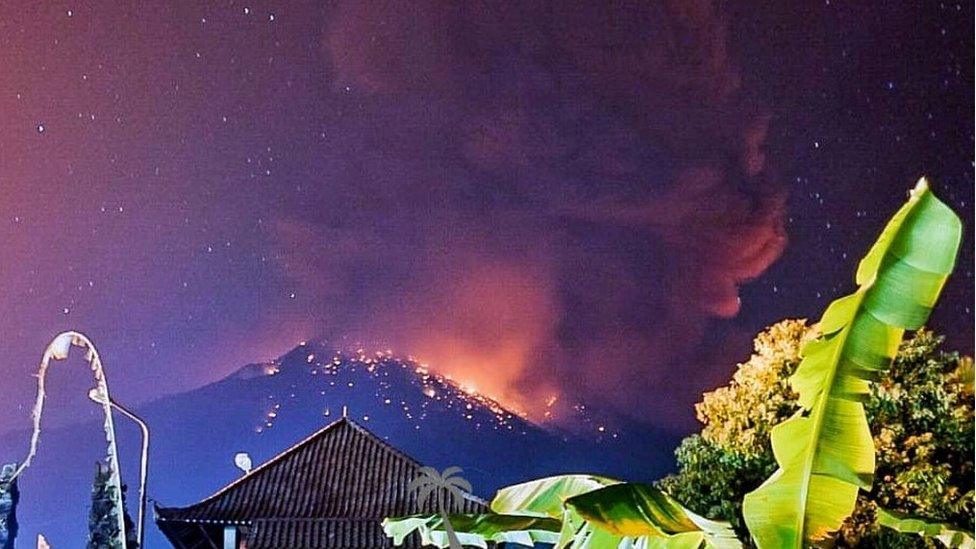
- Published28 September 2014
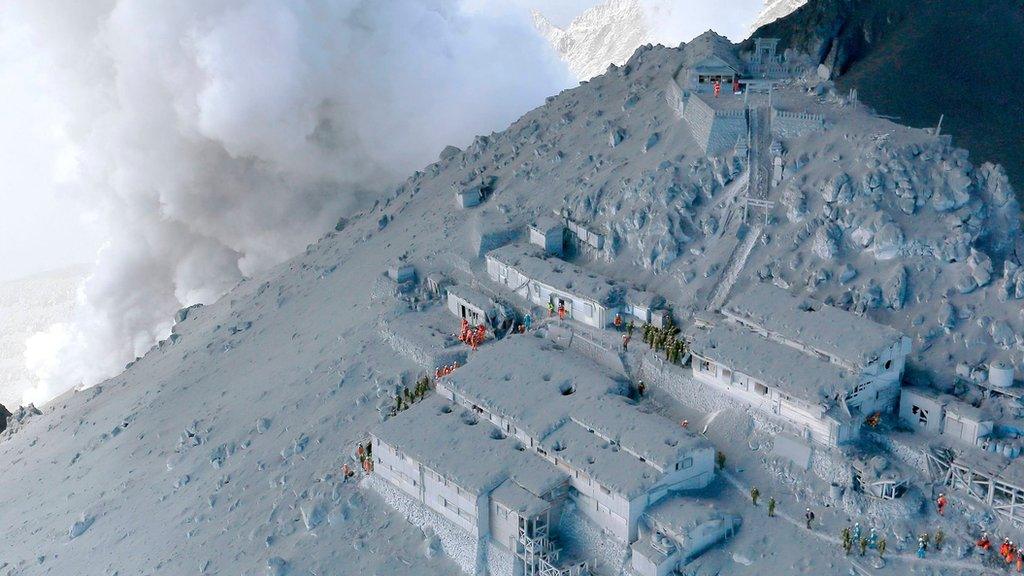
- Published23 January 2018
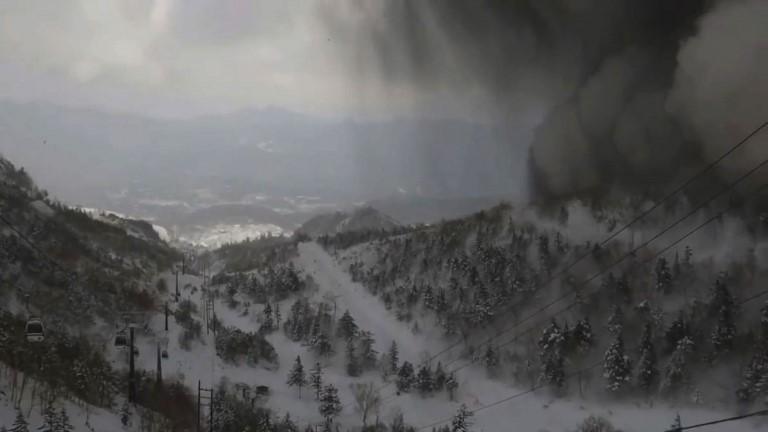
- Published27 November 2017
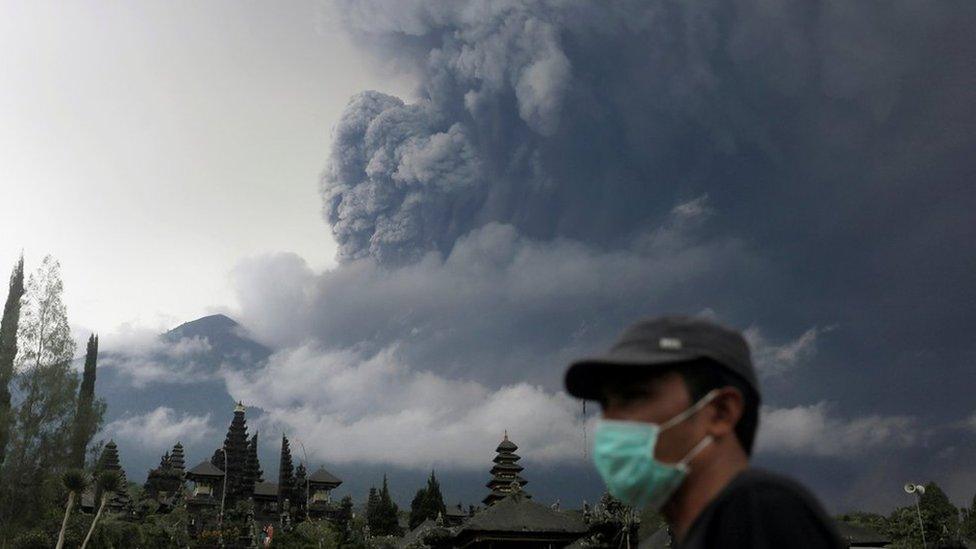
- Published16 March 2017
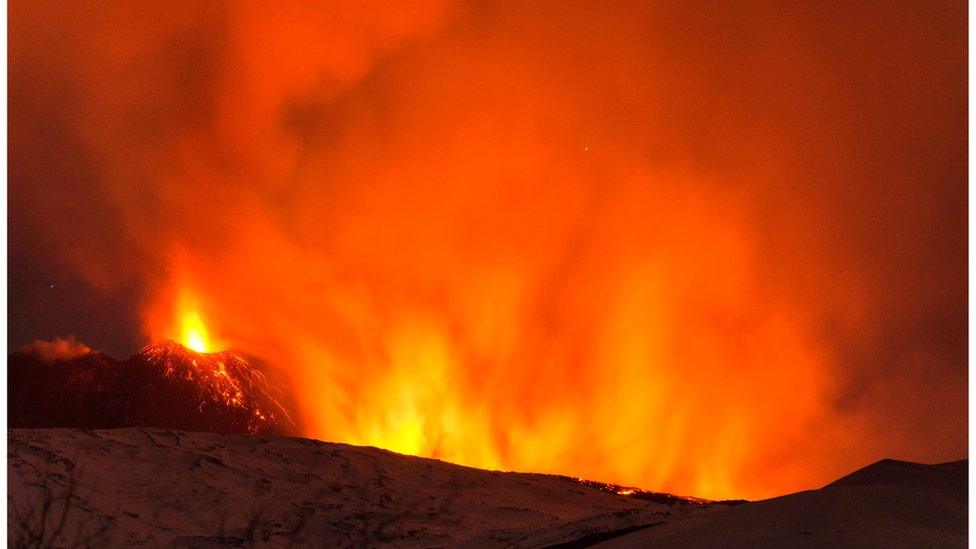
- Published19 October 2017
